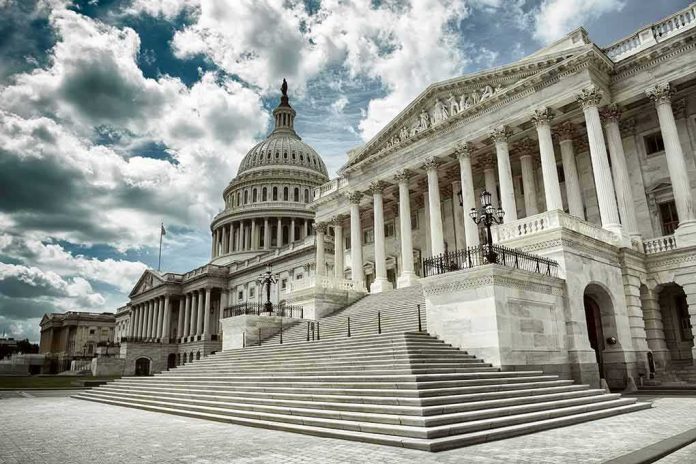
In a political showdown that questions the very foundation of democratic processes, a Democrat Attorney General has taken legal action against the House GOP for their refusal to seat a Representative-elect during a government shutdown.
Story Snapshot
- A lawsuit filed by a Democrat Attorney General against the House GOP for not seating a Representative-elect during a government shutdown.
- The Attorney General argues that the refusal is unconstitutional and undermines democratic processes.
- The lawsuit highlights ongoing political tensions and power struggles between Democrats and Republicans.
- This case could set a precedent for future disputes over seating elected Representatives.
Constitutional Clash: The Lawsuit Unfolds
The Democrat Attorney General’s lawsuit against the House GOP represents a significant constitutional confrontation. The refusal to seat the Representative-elect during a government shutdown has raised alarms about the potential violation of constitutional principles, particularly the electorate’s will. This legal battle is not just about one seat; it encapsulates the broader political dynamics and constitutional rights that underpin American democracy.
The lawsuit’s timing amid a government shutdown adds complexity to an already volatile situation. The shutdown, triggered by unresolved budget disputes, serves as a backdrop to the legal proceedings. The Attorney General’s argument hinges on the constitutional imperative to respect electoral outcomes, challenging the House GOP’s stance and the motivations behind their refusal to seat the Representative-elect. This case may redefine the balance between political maneuvering and constitutional obligations.
Political Power Dynamics in Play
The refusal to seat the Representative-elect is not merely a procedural issue; it reflects deeper political power struggles. The House GOP’s motivations, potentially rooted in political strategy or policy disagreements, contrast sharply with the Democrat Attorney General’s focus on upholding democratic principles. This clash underscores the broader partisan divisions that have marked the current political climate, with each side seeking to assert its influence over the legislative process.
These power dynamics are not new but have intensified in recent years, often resulting in government gridlock and heightened political tensions. The outcome of this lawsuit could have lasting implications for how political disputes are resolved and the extent to which constitutional rights are safeguarded in the face of political challenges.
Implications for Governance and Democracy
The implications of this legal battle extend beyond the immediate parties involved. The Representative-elect, unable to take office, faces direct consequences, as do their constituents, who may feel disenfranchised by the delay. This situation also poses broader questions about governance during periods of political instability and the potential economic impact of prolonged government shutdowns.
In the long term, the lawsuit’s outcome could set a precedent for future disputes over the seating of elected Representatives. It could influence political strategies and power balances, potentially reshaping the legislative landscape. As political polarization continues to challenge traditional governance models, this case serves as a critical test of the resilience of democratic institutions and processes.
Expert Opinions and Legal Perspectives
Legal experts and political analysts are closely watching this case, viewing it as a litmus test for the intersection of political power and constitutional rights. Constitutional scholars emphasize the importance of respecting electoral outcomes, while political analysts interpret the situation as part of a broader strategy to maintain or shift power dynamics within the House.
Diverse viewpoints emerge from this situation; supporters of the lawsuit see it as a necessary defense of democratic principles, while critics may argue that it represents a political maneuver. As the legal proceedings continue, the case highlights the complex interplay between law and politics, with potential ramifications for future governance and political strategies.
Sources:
New York Times – “Democrat Attorney General Sues House GOP Over Refusal to Seat Representative-Elect”
Washington Post – “Lawsuit Challenges House GOP’s Decision Not to Seat Elected Representative”
Harvard Law Review – “Constitutional Implications of Refusing to Seat Elected Representatives”
Politico – “House GOP Faces Lawsuit Over Representative-Elect Dispute”















